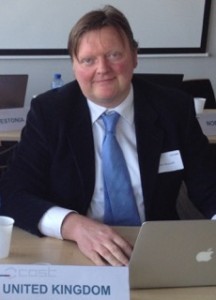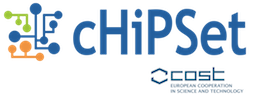HPC-enabled Modelling for Life Sciences
Chair: Dr. Andrea Bracciali, United Kingdom
Vice-Chair: Prof. Salvatore Vitabile, Italy
Life Sciences typically deal with and generate large amounts of data, e.g. the flux of terabytes about genes and their expression produced by state of the art sequencing and microarray equipment, or data relating to the dynamics of cell biochemistry or organ functionality. Some Modelling and Simulation techniques require the investigation of large numbers of different (virtual) experiments, e.g. those addressing probabilistic and noise aspects or based on statistical approaches. Curation and mining of large, typically multimedia, medical datasets for therapeutic and analytics purposes, are computationally expensive. Recent and future developments, such as personalised medicine need to integrate a mix of genomics, Systems and Synthetic Biology and medical information in a systemic description of a single individual. A surge of large-scale computational needs in these areas spans from the BBMRI (Biobanking and Biomolecular Resources Research Infrastructure) and the flagship effort Human Brain Project, which targets simulating the behaviour of a human brain, to COST 103/14 23 EN FP7 projects like PD-HUMMODEL, TRANSFORM. In fact this Action integrates well with the goals of the ESFRI Roadmap, promoted by the EC. Requirements go from pure computational efficiency, to large data file management and storage capabilities and vast memory-bound computational power. WG3 will foster the much-needed integration of HPC architects and Life Sciences modellers, with the goal of letting them develop and diffuse a coordinated, mature and productive use of HPC facilities.
WG3 activities will:
- Identify general classes of MS problems in Life Sciences, e.g. omics and medical data mining and simulation in Systems and Synthetic Biology, stimulate integrated development of HPC-enabled solutions to MS problems, and evaluate the proposed frameworks.
- Encourage and monitor the publication and diffusion of results in relevant venues of both communities (novel interdisciplinary editorial proposals can be attempted, if appropriate).
- Foster collaboration pools within Europe, including academia, industry and overseas partners, for the development of integrated prototype and demonstrative tools, hence facilitating the path to market for innovative technologies and newly developed ideas.
- Coordinate collaboration for grant applications, which will support the follow-up of the activities of the WGs and will contribute to diffuse best practices in the areas;
- Make an outreach attempt towards bio and medical communities, tightening the links between computational, theoretical and experimental approaches in Life Sciences.
WG3 Chairs
 Andrea Bracciali received a PhD in Computer Science from the University of Pisa, Italy, in 2003, with a thesis on Behavioural Patterns and Software Composition. He has held research positions with the University of Pisa, the Italian CNR and is currently a SICSA Lecturer at Stirling University, UK. His research interests regard the application of formal methods to the modelling and verification of interactive systems. Applications include the (symbolic) semantics of concurrent and distributed systems, the verification of component composition and security protocols. More recently, he has worked on formal modelling in Systems Biology and Life Sciences, including computational and stochastic quantitative models of synaptic activity, analysis of infective diseases and their treatments, the modelling of population dynamics phenomena, such as emergency egresses and the dynamics of populations of endangered species in wild-life. He has developed his research in collaboration with various colleagues from different institutions and nations, publishing more than 60 papers. He has participated in national and EU projects.
Andrea Bracciali received a PhD in Computer Science from the University of Pisa, Italy, in 2003, with a thesis on Behavioural Patterns and Software Composition. He has held research positions with the University of Pisa, the Italian CNR and is currently a SICSA Lecturer at Stirling University, UK. His research interests regard the application of formal methods to the modelling and verification of interactive systems. Applications include the (symbolic) semantics of concurrent and distributed systems, the verification of component composition and security protocols. More recently, he has worked on formal modelling in Systems Biology and Life Sciences, including computational and stochastic quantitative models of synaptic activity, analysis of infective diseases and their treatments, the modelling of population dynamics phenomena, such as emergency egresses and the dynamics of populations of endangered species in wild-life. He has developed his research in collaboration with various colleagues from different institutions and nations, publishing more than 60 papers. He has participated in national and EU projects.
 Salvatore Vitabile is an associate professor with the Department of Biopathology and Medical Biotechnologies at the University of Palermo,Italy. He received the Laurea degree in Electronic Engineering and the Doctoral degree in Computer Science from the University of Palermo in 1994 and 1999, respectively. In 2007 he was Visiting Professor at the Department of Radiology, Ohio State University, Columbus, USA. Dr. Vitabile is the Editor in Chief of the International Journal of Adaptive and Innovative Systems (Inderscience Publishers). He has also joined the Editorial Board of the Journal of Ambient Intelligence and Humanized Computing (Springer), the International Journal of Information Technology, Communications and Convergence (Inderscience Publishers), and the International Journal of Space-Based and Situated Computing (Inderscience Publishers). He has co-authored more than 150 scientific papers in referred journals and conferences. He has chaired, organized, and served as member of the organizing committee of several international conferences and workshops. Dr. Vitabile is currently member of the Board of Directors of SIREN (Italian Society of Neural Networks). His research interests include medical data processing and analysis, specialized architecture design and prototyping, neural networks, biometric authentication systems, and real-time driver assistance systems.
Salvatore Vitabile is an associate professor with the Department of Biopathology and Medical Biotechnologies at the University of Palermo,Italy. He received the Laurea degree in Electronic Engineering and the Doctoral degree in Computer Science from the University of Palermo in 1994 and 1999, respectively. In 2007 he was Visiting Professor at the Department of Radiology, Ohio State University, Columbus, USA. Dr. Vitabile is the Editor in Chief of the International Journal of Adaptive and Innovative Systems (Inderscience Publishers). He has also joined the Editorial Board of the Journal of Ambient Intelligence and Humanized Computing (Springer), the International Journal of Information Technology, Communications and Convergence (Inderscience Publishers), and the International Journal of Space-Based and Situated Computing (Inderscience Publishers). He has co-authored more than 150 scientific papers in referred journals and conferences. He has chaired, organized, and served as member of the organizing committee of several international conferences and workshops. Dr. Vitabile is currently member of the Board of Directors of SIREN (Italian Society of Neural Networks). His research interests include medical data processing and analysis, specialized architecture design and prototyping, neural networks, biometric authentication systems, and real-time driver assistance systems.
